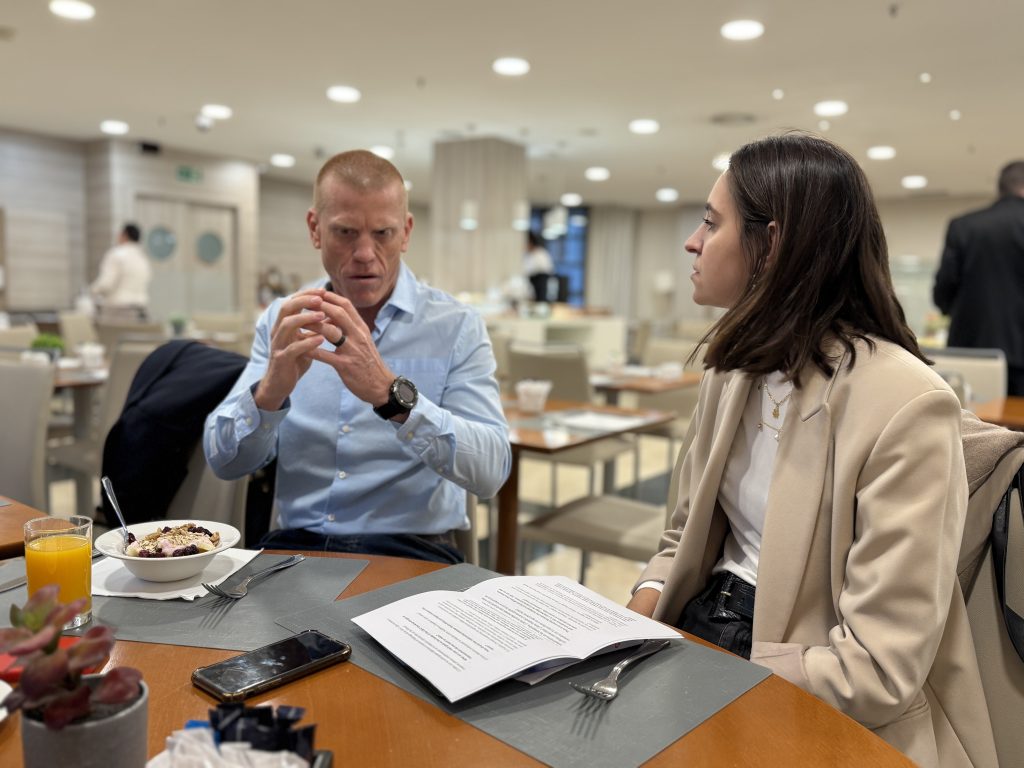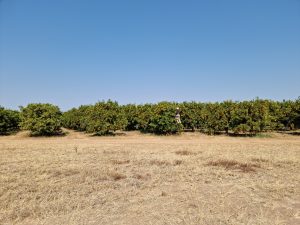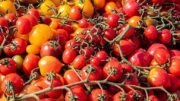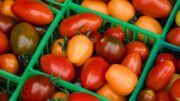Interview with Jan-Louis Pretorius, Vice-Chairman of the Board of Directors of the Citrus Growers Association of South Africa (CGA)

According to Jan-Louis Pretorius, for the WCO to be a real success, the entire Spanish industry must be involved / ALBA CAMPOS
Julia Luz. Valencia.
The global citrus industry is going through a tough time, with new regulations, logistics issues and stronger competition. In this context, a delegation from South Africa’s Citrus Growers’ Association (CGA) stopped in Valencia during their trip to Europe for Fruit Logistica. Their aim: to connect with the Spanish citrus sector at a critical moment for international trade. Between meetings and talks, Valencia Fruits had the chance to have breakfast with them, where the conversation focused on shared challenges and trade tensions between the two countries. Topics like falling consumption, overlapping harvests, pest interceptions and mirror clauses came up.
Access the interview in Spanish here.
Valencia Fruits. What has brought you here? And in your view, how should the relationship between Spain and South Africa be?
JLP. Well, South Africa and Spain are the two biggest citrus-exporting countries in the world. The good thing is that we don’t really compete, we are number one and number two, but in reality, we are both number one because our production seasons are opposite.
However, the relationship between our industries is not as good as it should be, it’s not at the level that we believe it should be. As growers, we decided it was time to reach out to our Spanish counterparts. This idea actually came from one of our board meetings. The goal is to understand each other better because sometimes information gets distorted. We believe that South African and Spanish growers have much more in common than what drives us apart.
Instead of fighting, we should collaborate. The real challenge is that demand for most citrus types—except mandarins—is slowly declining. That is the common enemy. That’s what we should be focusing on, not fighting each other. If we work together on technical issues, market development, and increasing consumer demand, the entire citrus industry will benefit. For now, the technical and phytosanitary disputes between us are preventing us from working together to improve the industry.
“Instead of fighting, we should collaborate. The real challenge is that demand for most citrus types—except mandarins—is slowly declining. If we work together on technical issues, market development, and increasing consumer demand, the entire citrus industry will benefit”
“Our goal here is to open a dialogue, build relationships, and bring the different players together to work towards a common goal: the overall health of the citrus industry”
VF. Do South African growers see Spanish growers as competitors or enemies?
JLP. Not at all. We don’t see ourselves as the enemy of the Spanish grower. There’s a perception that we don’t care about pests or that we are dumping a lot of fruit into the market, but that couldn’t be further from the truth. That has never been our intention.
In fact, we buy a lot of agricultural equipment and technical services from Spain. Many of us, including myself, manage small growers, so we understand how tough the market is. We know that small Spanish growers are struggling, and we want to reach out to them.
“There’s a perception that we don’t care about pests or that we are dumping a lot of fruit into the market, but that couldn’t be further from the truth. This technical and phytosanitary disputes between us are preventing us from working together to improve the industry”
We believe that just by starting a conversation, we will realize we have more in common than we think. Our goal here is to open a dialogue, build relationships, and bring the different players together to work towards a common goal: the overall health of the citrus industry.
VF. In Spain and Europe, farmers follow strict health and safety rules for their crops. Some Spanish growers claim that South African farmers do not follow the same regulations when exporting fruit. How do you respond to that?
JLP. I think this is part of a misunderstanding. The dispute we have with the European Union is about science. We believe that the measures imposed on us for citrus Black Spot and False Codling Moth are not proportionate to the actual risk these pests pose.
The Citrus Growers Association invests 60% of its funds in research, and our studies —along with research from other parts of the world— show that the current restrictions are not fully justified. It’s not that we don’t want to comply. In fact, we have one of the most effective risk mitigation and compliance systems in the world.
“The dispute we have with the European Union is about science, we believe that the measures imposed on us for citrus Black Spot and False Codling Moth are not proportionate to the actual risk these pests pose”
The problem is that these measures are costing our industry 3.7 billion rand per year (185 million euros), which threatens our sustainability. We have been trying to resolve this issue through discussions since 1997, but since we couldn’t reach an agreement, we had no choice but to take the case to the World Trade Organization (WTO). The goal is to have an independent panel of specialists review the science and make an objective decision.

South Africa has established itself as a major citrus growing power, standing out for its sustained growth, crop diversification and strong presence in international markets. / CGA
VF. Does this dispute affect your relationship with Spanish growers?
JLP. No, it shouldn’t. That’s an important message we shared with the Spanish growers during our meetings. No matter what happens with the WTO case, we still need to do business together and work as partner industries. The sooner we start building stronger ties, the better.
And just to be clear, despite our disagreement with the EU’s measures, in practice, we already follow all the required protocols. If you visit South Africa, you’ll see that we do things exactly the way the EU expects. We take this very seriously. That’s why we’ve invited Spanish growers to come and see our operations for themselves.
Finally, I want to stress that our visit to Spain has nothing to do with the WTO case. That’s a legal process, and it’s not our focus here. We are here to build relationships with Spanish growers and strengthen our cooperation.
VF. In 2023, Spain intercepted more than 30 shipments of South African citrus with black spot. If your health measures are so effective, how do you explain this?
JLP. Let’s talk about citrus Black Spot. The science shows that the disease is only transmitted through plant material, not through the fruits itself. Even though a Mediterranean climate, like in Spain, is significantly less susceptible to the establishment of CBS, you are only at risk if you import plant material from affected areas. We know this not only from the latest scientific research, but also from experience that the fruit itself does not spread the disease.
For example, in South Africa, we transport large volumes of fruit, including lemons —one of the most susceptible citrus varieties— from CBS affected regions to the Western Cape, which has a Mediterranean climate. Despite doing this for decades already, Black Spot has never established itself there. This supports the view that the disease does not spread through fruit.
South Africa has very strict control measures on the movement of plant material. In fact, it is a criminal offense for growers to violate these regulations, and the industry itself enforces compliance. So, when you compare the number of interceptions to the total volume of citrus we export to Europe, the percentage is extremely small.
VF. But even if the percentage is small, shouldn’t interceptions be zero?
JLP. The measures we have in place are designed to achieve 100% compliance, and that is always our goal. However, citrus Black Spot is not like a pest that you can simply spray and eliminate. It requires a combination of strategies to manage and reduce risk.
“In Brussels they see interceptions as black-and-white, “compliant” or “non-compliant,” without considering the context of interceptions, so, our argument often isn’t heard”
Despite our best efforts, achieving 100% success is extremely difficult. That’s why we have invited Spanish growers and regulators to visit South Africa and see our processes firsthand. If they have better ideas, we are open to learning from them. But the reality is that South Africa is the best in the world at managing citrus black spot.
I would love to see any other process in the world that can guarantee a 99.99997% success rate. That said, we also understand —some of us have even had the privilege of being in Brussels— that they see interceptions as black-and-white, “compliant” or “non-compliant,” without considering the context of interceptions. So, our argument often isn’t heard. But we also have to think practically about the volume we export. You can’t compare South Africa to another country that ships significantly less and has only one interception.

Andries van Wyngaardt, Hannes de Waal, Piet Engelbrecht, Thomas Landman and Jan-Louis Pretorius are members of the Board of Directors of the Citrus Growers Association of South Africa (CGA). / ALBA CAMPOS
VF. But don’t the interceptions of South African fruit with Black Spot mean a danger for Spain?
JLP. No. The scientific evidence is clear: black spot can only spread through infected plant material (such as seedlings, trees, leaves or twigs), not through the fruit. If Spanish growers want to prevent the disease from entering their groves, the focus should be on plant imports, not fruit. That is where the real risk is.
That’s why we sometimes feel we are being treated unfairly. It seems like citrus black spot is being used as a trade barrier rather than a real plant health concern.
VF. How do you deal with market overlap between South African and Spanish citrus?
JLP. We are very sensitive to the issue of overlap because when South African and Spanish citrus enter the market at the same time, prices drop significantly. Given our high shipping costs, this can lead to major financial losses.
One of the main causes of overlap is logistical challenges. If ports operate inefficiently, delays can cause South African citrus to arrive at the same time as Spanish fruit, which is not our intention. That’s why we have been pushing for improved port efficiency, more shipping options, and better logistics planning.
We have also asked the Spanish industry to improve port operations. Delays in Spanish ports create bottlenecks that make the overlap problem worse. If logistics were more efficient, we could coordinate supply better.
“One of the main causes of overlap is logistical challenges. If ports operate inefficiently, delays can cause South African citrus to arrive at the same time as Spanish fruit, which is not our intention”
That being said, South African citrus does not directly compete with Spanish citrus year-round. In fact, we complement each other. European retailers need a consistent supply of quality citrus throughout the year. If South Africa were cut out of the market, there would be a gap in supply during the summer, which would hurt the overall citrus category, including Spanish growers.
VF. What role does the World Citrus Organization (WCO) play, and should Spain be more involved?
JLP. We believe the WCO is a great platform to promote common interests. Right now, Spain is only represented through Alimpo and a few commercial players. For the WCO to really succeed, the whole Spanish industry needs to be actively involved. You can’t have the world’s number one citrus producer standing on the sidelines, it just wouldn’t make sense.
Of course, we can’t force Spain to participate, but we can start the conversation. If Spain isolates itself, other countries will continue to grow and expand. Instead, we could share knowledge. We have faced many of the same problems Spain is now dealing with —climate change, new regulations like the Green Deal— and we have already made significant investments in research.
For the WCO to really succeed, the whole Spanish industry needs to be actively involved. You can’t have the world’s number one citrus producer standing on the sidelines, it just wouldn’t make sense
Spain has incredible potential to be the hub of fruit in Europe. There are great facilities here, and the people understand fruit, just like we do. We live fruit, they live fruit. So, there is a lot of opportunity for us to work together.
VF. What is your opinion on mirror clauses?
JLP. Mirror clauses refer to the idea that if Spanish farmers must comply with certain regulations, then all countries exporting to Spain should meet the same standards.
For us, this concept is not new. Many countries, like the U.S. and South Korea, already send inspectors to verify compliance in our orchards. We have been used to this for many years, as every country has its own unique set of requirements.
However, while we understand the idea behind mirror clauses, we believe they must be based on science. You cannot expect all regulations—such as labor laws or environmental policies—to be applied in the same way everywhere. Each country has different contexts, and some requirements might not be practical or necessary in all regions.
VF. What feedback do you receive from your export markets?
JLP. Most of our destinations are satisfied with our products. The only market where we face consistent challenges is Spain.
In the rest of Europe, regulations have changed over the years, but they have been clearer and more predictable. This stability allows us to plan and adapt. However, in Spain, the situation has been more confrontational.
Outside of Europe, we have stable relationships with the U.S., China, Russia, India, the Middle East and other countries. For example, California is very protective of its citrus industry, but we do not have direct conflicts with them. The same applies to China, though we are aware that their growth and market spread could become a competitive challenge in the future.
VF. You recently met with key players in the Spanish citrus industry. What did you learn from those conversations?
JLP. We were welcomed very positively by the Spanish growers, and they were open to talking about the challenges they face, which is a great start. One of the main problems we noticed is that small growers are finding it difficult to deal with stricter requirements. Larger farms can handle these demands more easily, but it’s much harder for the smaller ones. Another issue is that the industry isn’t united. There’s no single voice, which makes it harder to tackle problems together and find common solutions. In South Africa, we have a more organized system that helps us work together better, and that’s something that could benefit Spain too.
“European retailers need a consistent supply of quality citrus throughout the year. If South Africa were cut out of the market, there would be a gap in supply during the summer, which would hurt the overall citrus category, including Spanish growers”
Also, we believe sometimes the focus here is too much on protectionism. If you approach things out of fear and aggression, you miss the chance to learn, grow, and innovate. Instead of always trying to protect, we should be asking: Here’s my problem, how can I improve? How can I work with others to achieve more? This is the mindset we’re trying to promote in a diplomatic way.

Jan-Louis Pretorius warned that excluding South Africa would leave European retailers without quality citrus at certain times / CGA
VF. The Citrus Growers’ Association plays a key role in representing South African citrus producers. What are its main goals?
JLP. Our organization exists because growers pay a statutory levy on every export. Sixty percent of that money goes to research, and that’s one of our biggest priorities. This research helps us become better farmers by improving our technical knowledge.
Our second priority is market access. We want to make sure we can trade with as many countries as possible. A lot of the research we do is actually the foundation for meeting the conditions required to export our citrus. So having good research is really important.
Another crucial focus area is logistics. The citrus industry moves a huge amount of fruit from different parts of South Africa, through our ports, and onto ships going all over the world. Right now, logistics in South Africa aren’t working as well as they should, so that’s something we really need to improve.
Information management is also essential. As a growers’ association, we sit at the center of the supply chain, working with growers, service providers, and buyers. Understanding volumes, timing, and market trends is really important to keep a well-functioning industry.
Lastly, transformation is a big goal for us, especially in South Africa. We want to support black growers in becoming fully commercial farmers so that our industry reflects the country’s demographics.
All of this is part of a bigger plan called “Vision 260”. This is South Africa’s goal to export 260 million cartons of citrus by 2032, and that’s the growth path we are working towards.
VF. Do you think South Africa will play a role in the future of global trade?
JLP. Absolutely. We will play our part because as global trade grows, opportunities increase for everyone, including South Africa. Our approach is both to contribute to global trade and to learn from it. We see this as a cooperative kind of situation.
South Africa also aims to take a leadership role in the citrus industry. That’s why we were founding members of the World Citrus Organization, following the example of similar global organizations in the avocado and apple industries. We are committed to maintaining this leadership role, especially in areas like research, where we have world-class scientific expertise that benefits the whole citrus sector.
For us, from an economic perspective, market expansion is crucial. The South African citrus industry employs a lot of people, and given our country’s high unemployment rate, increasing citrus production and exports is in our national interest. Since our domestic market is small, we must continue expanding into global markets, introducing our products to new consumers. This benefits not only South Africa but also other citrus-producing countries with counter-seasonal supply. Additionally, it’s important to highlight that South Africa is by far the largest citrus supplier in the Southern Hemisphere. Our strategic location and production capacity position us as a key player in global citrus trade.
Lastly, we hope that in the coming years, the conversation about our relationship with Spain will evolve positively. From our side, we are making an effort to better understand the challenges, concerns, and opportunities for collaboration. The initial response from recent meetings has been encouraging, and we are committed to building a future where citrus demand continues to grow, allowing all of our businesses to prosper.











